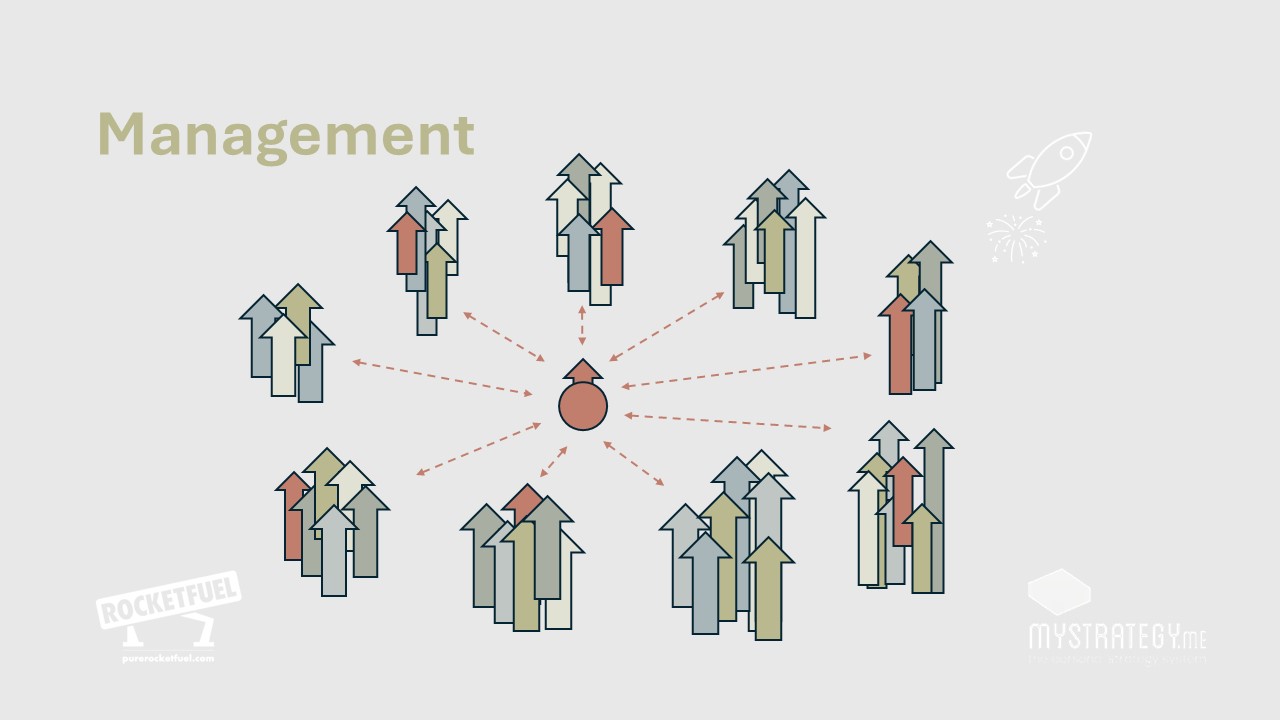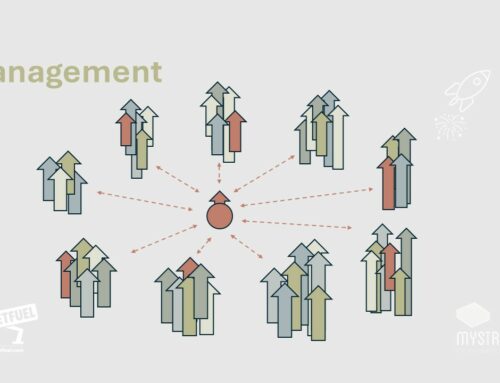
In this post, Leadership & Performance Coach, Davina Greene explores what Management actually entails and some points worth considering before you embark upon your management aspirations.
In my work, I’ve met so many people over the years who craved their first – or next – step up the managerial ladder. Likewise, I met just as many on the managerial ladder who wish they had found a different route to career enhancement by employing a bit of creativity.
If you truly want to pursue a management role, how can you make sure you are doing it for the right reasons? The best reason for taking on a managerial role is as follows: Because it suits you. It suits your behaviors and attitudes, your temperament, and will not become a burden that creates stress and grinds you down, impacting your own mental or physical wellbeing. Or, of course, that of others.
Will people heed this warning? Of course not! To “rise the ranks” is one’s entitlement after years and years of education, is it not? (Hmm…) A good starting point – to introduce a sense of reality to the ambition, at the very least, if not to curtail it – is to refer to it as “people management”, for that is what it essentially is, in all but the rarest circumstances.
Sadly, many aspiring managers see existing managers doing the technical parts of the role, glossing almost entirely over the human aspects of the role, and assume that they can simply do the same. ‘Poor management’, therefore, continues to appear as a reason for Wellbeing and Staff Turnover issues across various surveys, despite the millions of hours and dollars spent on Management Training every year over the decades.
Management Aspirations: The Role
Why would anyone hold management aspirations? Let’s think about it.
What is a manager? First of all, the job is to “get things done” – through good organization of oneself and of the people in the team. Beyond that, a manager is a person who has a good overview of the technical requirements of his or her area of management, but not necessarily the hands-on ability to do all of it (think more “conductor of the orchestra” than “jack of all trades”). Alongside this, they are a great organizer, a good communicator and teacher, can manage the quirks of multiple people’s behaviors and attitudes simultaneously without significant discomfort. They are a good listener when someone needs a hand, and a good fire-fighter when all hell breaks loose.
That, to me, is Management – let’s park the Vision, Influence and other factors that would lead us into Leadership territory, for now.
I find that people are increasingly struggling to understand their role as a manager, and the issues vary depending on the company size. Many companies continue to promote people based on their length of time with the company, which is quite mind-boggling in this day and age. Many – especially start-ups – fall into the trap of promoting technical experts and then wonder why relationships, cooperation and the enthusiastic ‘push’ culture in the business begin to fall apart.
Many with management aspirations see HR taking care of Training & Development and Project Managers looking after the larger pieces of work, and therefore believe that they don’t need to concern themselves with anything beyond a slightly more advanced understanding of their topic, and a monthly diary slot to have “a bit of a chat” with the team, “because HR said I have to”.
Many very senior managers also do not have the vocabulary – or backbone – to explain to someone why they are not suited to Management, allowing the cycle to continue due to no more than the persistent nagging of the aspirant manager. Conversely, some managers are promoted or hired because they are viewed as empty vessels that more domineering senior managers can sway to their own needs – would you be happy to be that person, just for the title?
Management Aspirations: The Impact
Management is just like any other area where you are volunteering yourself into a position where you impact people’s lives in a significant way – like a parent impacts a child, like one partner impacts the other. People’s lives depend, nowadays, on their ability to achieve an income doing something they know how to do, and hopefully also enjoy doing. If you step into the mix and have no care in the world about your team as individuals, this can have a devastating knock-on effect. That’s probably power aspirations, or status aspirations; not management aspirations.
No business can bend over backwards to dodge the sensitivities of the softest soul in the building; however, nor can – or should – a business tolerate a manager who demotivates a once-content team. Too many managers have absolutely no interest in dealing with people, and why companies continue to promote them is beyond me. As a (hopefully!) extreme example, if I was a physicist, I may be delighted to have The Big Bang Theory’s Sheldon Cooper sitting in my vicinity for intellectual purposes…but as my boss?! No, thank you.
Management Aspirations: The Choice
If you hold management aspirations, these simple questions can begin to help you decide if you are cut out for people management, and what your areas of development might be. Then, of course, it becomes about whether you are genuinely interested in developing those weaker areas, or whether it is merely a flicker of interest based on your desire to achieve a title by covering off the bare minimum of the requirements (being able to ‘talk the talk’, whilst probably never actually ‘walking the walk’):
- Are you highly organized? The core first-line task of Managers is to continue to get work completed, to a high standard, across individual or multiple tasks. It’s no longer just about you and your work – as Manager, when someone lags behind, you have to help them solve this. Overall team performance reflects upon you.
- Do you enjoy engaging with people? Does continuous human interaction motivate or irritate you?
- Do you enjoy the differences in people’s behaviors and attitudes? Are you happy to flex your approach in dealing with individuals, day to day? Or are you more of an “I am who I am. Deal with it” sort of a person.
- Do you intend to help people achieve further success? Or will you become a ‘cap’ on the team, content in having achieved your senior position and wishing to hold everything “as is” from now on?
- Do you enjoy sharing what you know, continuing to view yourself and your team as learners?
- Are you a glory-seeker? Will you be tempted to take credit for ideas, yet point the finger when something goes wrong?
- Do you enjoy predictability? Much work is quite predictable and comfortable; people, less so.
There are many bad reasons for holding management aspirations – power, control over others, obsessive desire to implement your own ideas, length of time with the company, salary-fixation (in truth, your manager probably doesn’t earn that much more than you, especially at the lower levels).
To step into the role for any of these reasons is to create negative outcomes for you, the business or the staff working under you. It is very possible to remain without staffing responsibilities and have a fulfilling career full of new learning, project work, travel and whatever else you wish, without being a Manager.
(Positive) Refusal of the Management Role
Some of the finest employees I have ever known, across multiple companies and industries, have refused to accept promotions – they want to stick to the mechanics of the role, and not take on “people issues” or the balancing act of ‘employee wants’ versus ‘organizational wants’. Some never had management aspirations in the first place, but some wisely observed the situation and set their management aspirations aside. Some of them, for example, are parents who have quite enough personalities to deal with at home, thank you very much; others are not, but are very self-aware and emotionally intelligent and can understand the potential impacts of the role in light of their own strengths and weaknesses. Others simply see the loss of work-life balance in managers above them, and so refuse promotion on that basis.
It absolutely shocked me when, in my mid-twenties, moving up the rankings, I started to become aware that excellent people I worked with were being offered promotions and refusing them. Wasn’t Management what we were all supposed to aspire to? What on earth was going on?!
That said, it didn’t take me long to understand their view. Being intellectually capable of understanding and doing something doesn’t necessarily mean that you should do it. It proved to me that the “Do the job, then you’ll get the job” view that some of my employers took was highly beneficial – lead projects, sort out issues happening between grown adults that they seem incapable of sorting out for themselves, try toeing the company line when asked questions by peers and project groups, even when there are parts of the “line” that are inexplicable to you…and then come back and tell me, after a few months of that, if you want to be a manager.
The example often given is that of a graphic designer who gets promoted. One day, they’re lost in a world of fonts, layouts and pantones, loving every minute of it, entranced by the sheer joy of what is happening on their screen. Next, they’re a manager, and their pleasurable design work is being interrupted by frequent client meetings and report-writing. Next, they’re running the company, and they cannot remember the last time they designed anything themselves – the thing they loved doing, the thing that kept them perfectly content for 37 hours per week, has now disappeared from their daily working life. Their management aspirations shot them in the foot.
Simply put, if you enjoy what you are doing now, think long and hard before changing it – and take a good look at the general lifestyle of a manager in your organization, rather than just “imagining the pay cheque” of a manager in your organization, before making up your mind!
Interested in investing in your own personal – and personal strategy – development? Check out www.MyStrategy.me!
Share This!
About the Author



